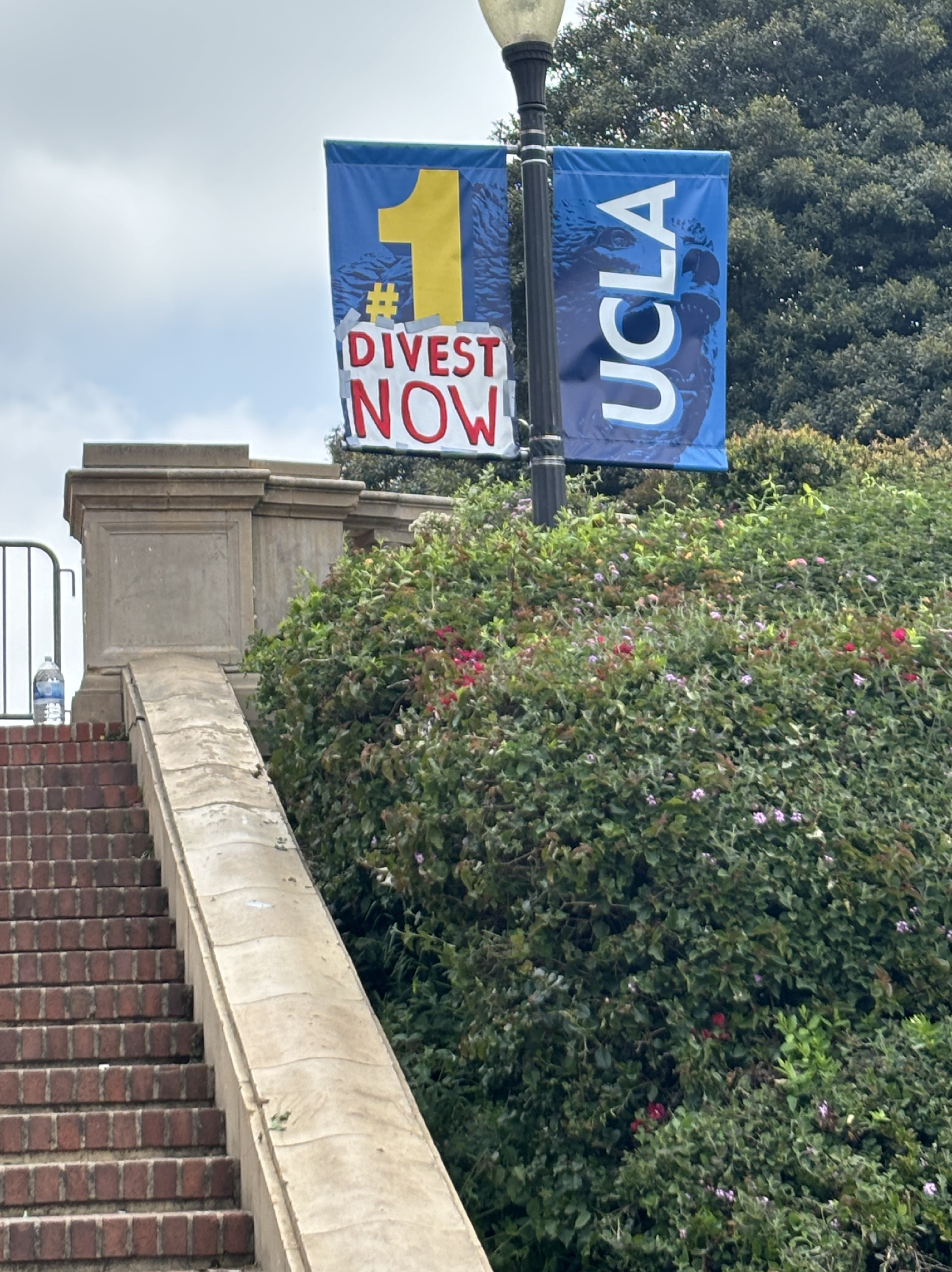
In 1991, Frank Donner, former director of the ACLU’s Project on Political Surveillance, published a book entitled Protectors of Privilege, which provided a history of police suppression of left-wing and labor protests in the United States.
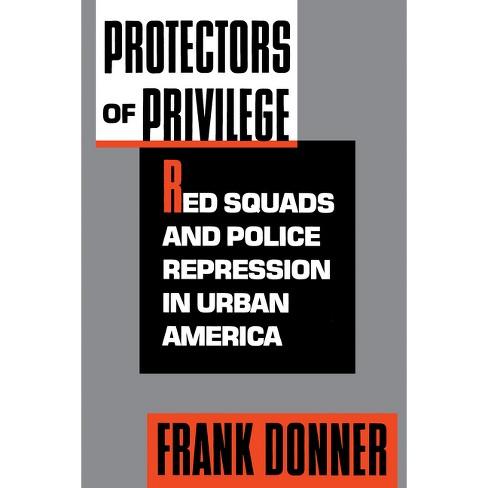
A key chapter in the book focused on the Los Angeles Police Department (LAPD), whose reactionary political function was epitomized by two of its most notorious chiefs: William Parker and Daryl Gates, who were overtly racist and supported anti-democratic paramilitary policing practices.
The LAPD’s true colors were on display at the University of California at Los Angeles (UCLA) at the end of April when its officers stood by for hours as hundreds of right-wing vigilantes attacked pro-Palestinian demonstrators in what Al Jazeera described as a “really shocking and ugly scene of violence.” The LAPD then aggressively broke up the pro-Palestinian demonstrators’ encampment using flash bangs and riot gear, arresting around 200 of the anti-genocide protesters who were entirely peaceful. (none of the vigilantes were arrested).[1]
![Pro-Israel attackers try to remove barricades at a pro-Palestinian encampment at the University of California, Los Angeles, on May 1, 2024 [David Swanson/Reuters]](https://covertactionmagazine.com/wp-content/uploads/2024/05/pro-israel-attackers-try-to-remove-barricades-at-a.jpeg)
On May 2, a day after the break-up of the encampment, I visited the UCLA campus and witnessed students and university employees clearing the protest area.
Though many of the students were refusing to speak to any media, I managed to interview one, Lisa Cooper, who described herself as a seasoned organizer originally from New York who had joined the protesters in solidarity with them.
Cooper told me that she helped run a wellness center in the encampment that brought in acupuncturists who administered treatment to students who had either been physically attacked or were dealing with emotional trauma and the stress of living in the encampment while studying for mid-terms.
The students believed they had to do something in the face of the horrific atrocities going on in Gaza.
Cooper said that dissent was currently under siege in the U.S. and that the protests provided an opportunity to get people thinking about societal problems and realities, and that the students involved felt empowered by their experience, which they would take with them into other aspects of their lives.
As part of the daily programming, students coordinated teach-in events like during the 1960s era Vietnam campus protests. Benjamin Kersten, a Ph.D. student in art history, told the UCLA Daily Bruin that “this is a public university that preaches the importance of education, and yet, topics like Palestine are not taught. A lot of the programming shows that people here are taking their education into their own hands, and learning what it means to teach each other and enact activist values.”[2]

According to Cooper, public protest is a right Americans enjoy under the U.S. Constitution and that this should not be forgotten.
Cooper said that the right wing vigilantes who stormed the encampment were equipped with bear mace, projectiles and other weapons that they deployed against protesters, causing injuries to some of the students.
One protester had 16 staples inserted into his scalp.
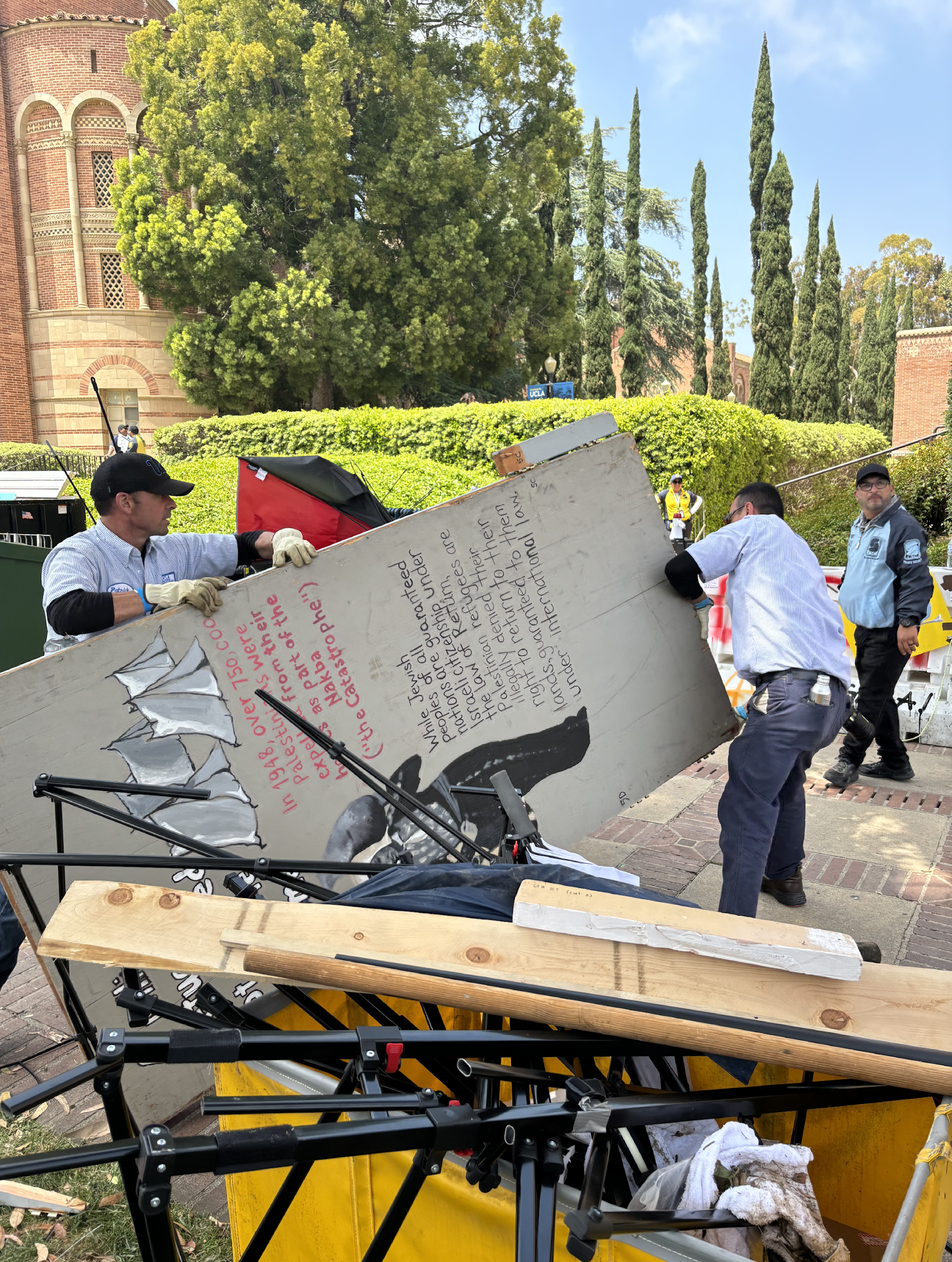
Because the students did not want to call 911 and put themselves at risk of suspension or arrest, other students drove them to the hospital by car.
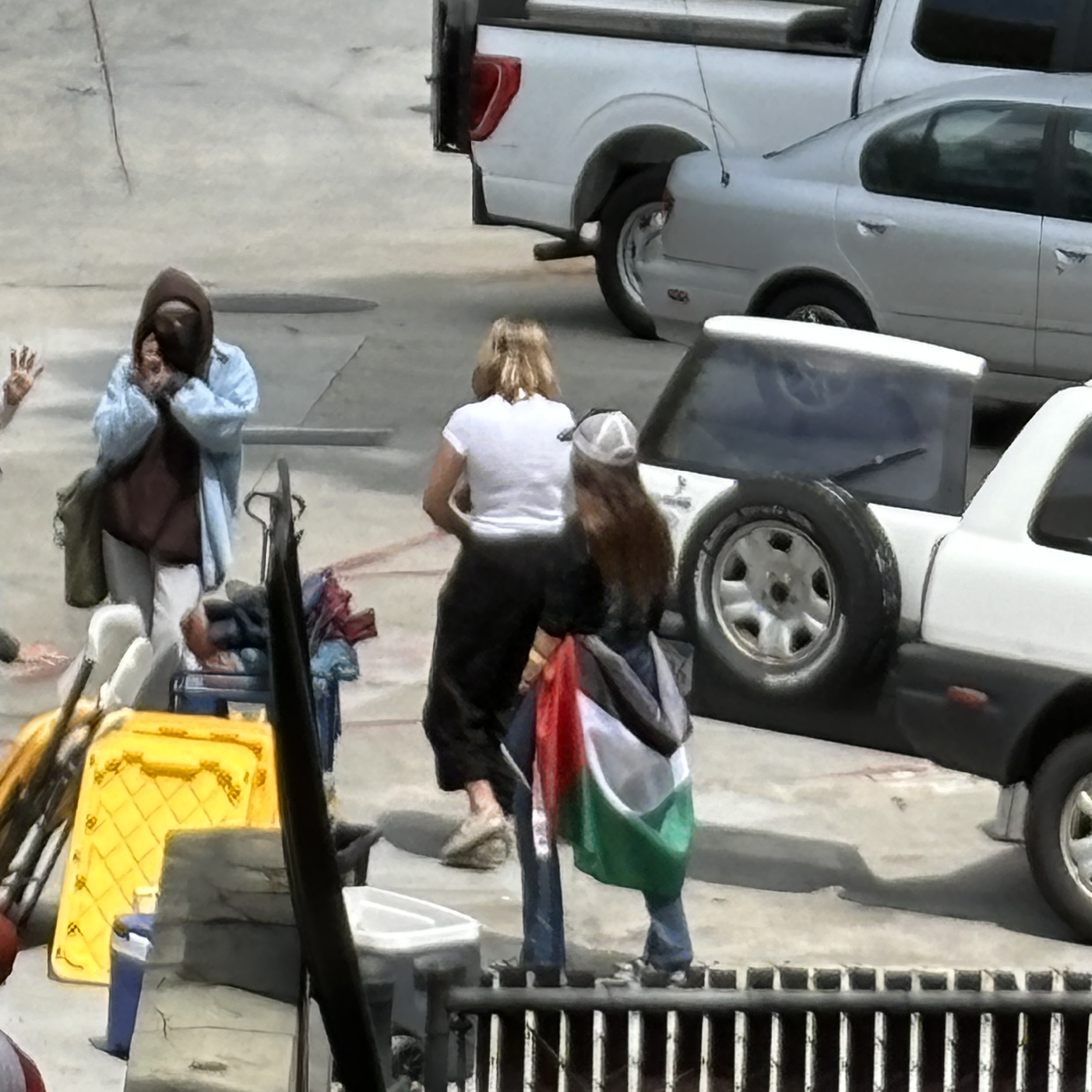
Cooper herself was not injured in the attack, but said that the vigilantes hurled racial slurs at her (she is African-American).
The main police units that broke up the encampment were officers of the California Highway Patrol (CHP) who, she said, are not required to wear body cam devices. CHP was backed up by the LAPD, whose presence was ubiquitous around the campus during my visit.
Cooper said that UCLA should be called to account for not allowing peaceful protests on public property.
UCLA President Michael Drake released a statement supporting the university’s decision to label the protest encampment as unlawful, noting that, “when it threatens the safety of students or everyone else, we must act.”[3]
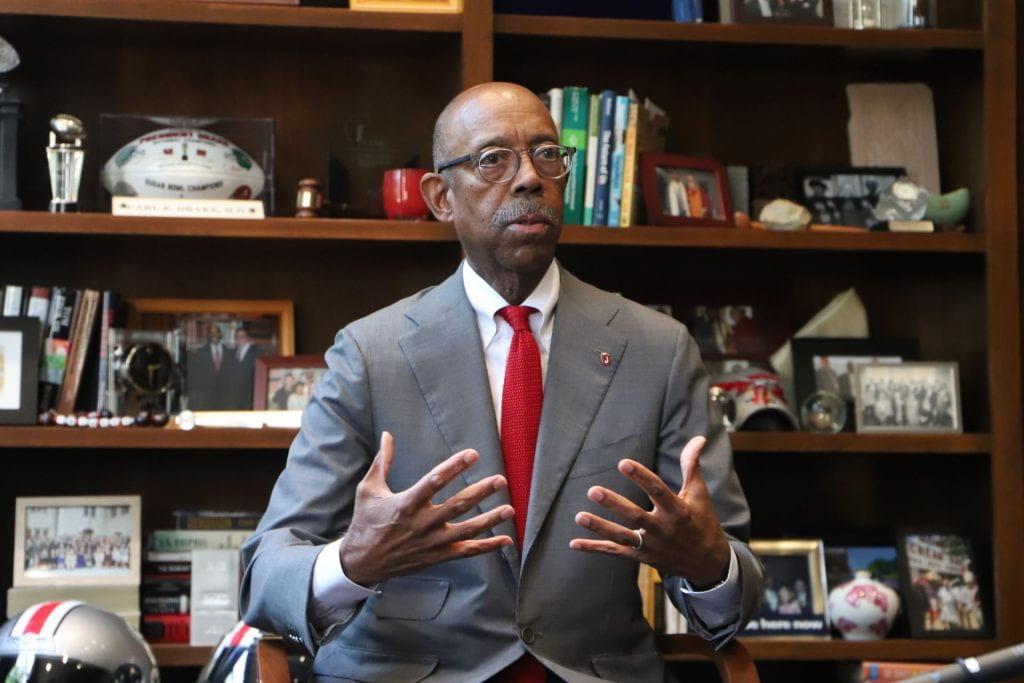
However, there is no evidence that the encampment threatened the safety of UCLA students in any way[4]; rather, it was the vigilante counter-demonstrators who compromised the safety of UCLA students expressing their constitutional right to dissent.
- For more details on the counter-protesters, see this important investigative piece published by The Grayzone.

-
During the vigilante attack, a group reportedly piled on one person who lay on the ground, kicking and beating the person until others pulled him out of the scrum. The editor of the UCLA Daily Bruin, Catherine Hamilton, was punched in the chest and upper abdomen by the vigilantes. Robert Reynolds of Al Jazeera reported that the vigilante mob, which called for a second Nakba, “appear[ed] to be all largely people who are not of student age and they’re not from the UCLA campus, but what they’re doing is trying to harass and attack the pro-Palestinian demonstrators.” The leaders of the anti-war encampment at UCLA said that “law enforcement simply stood at the edge of the lawn and refused to budge as we screamed for their help. The only means of protection we had was each other as the attack went on for more than seven hours.” “The university would rather see us dead than divest,” it added in a statement posted on X. The Los Angeles Public Defenders’ Union called the UCLA arrests “shameful and a complete failure of leadership.” President Garrett Miller said they are ready to “represent every person facing charges.” ↑
-
Dylan Winward, “Encampment Hosts Programming, Draws Counter-Protesters,” UCLA Daily Bruin, April 26, 2014, 2. Winward’s article detailed how Jewish Voices for Peace organized a passover seder in the encampment and shabbat service, dispelling the myth that somehow the students involved in the encampment were anti-semites. ↑
-
Anna Dai-Liu and Dylan Winward, “Pro-Israel counter-protesters attempt to storm encampment, sparking violence,” UCLA Daily Bruin, May 1, 2024, 1. ↑
-
Sam Mulick, “UCLA Community Responds to Palestine Solidarity Encampment,” UCLA Daily Bruin, APril 26, 2024, 3 quotes from students, the majority of whom had highly positive views of the encampment. This included numbers of Jewish students. One student quoted in the article expressed appreciation that students of this generation were politically active and cared about the plight of oppressed people in the world, while another said the encampment was an effective method to engage community members on the campus. Still another, a psychology student, Erin Lee, told The Daily Bruin that UCLA should offer more support to Palestinian students, and that the university had taken a direct role in the war in Gaza through its investments in companies affiliated with the Israeli military. She added correctly that while she thinks students in the encampment were sending a very powerful message, she doubts the UC system will respond to their actions. ↑
CovertAction Magazine is made possible by subscriptions, orders and donations from readers like you.
Blow the Whistle on U.S. Imperialism
Click the whistle and donate
When you donate to CovertAction Magazine, you are supporting investigative journalism. Your contributions go directly to supporting the development, production, editing, and dissemination of the Magazine.
CovertAction Magazine does not receive corporate or government sponsorship. Yet, we hold a steadfast commitment to providing compensation for writers, editorial and technical support. Your support helps facilitate this compensation as well as increase the caliber of this work.
Please make a donation by clicking on the donate logo above and enter the amount and your credit or debit card information.
CovertAction Institute, Inc. (CAI) is a 501(c)(3) non-profit organization and your gift is tax-deductible for federal income purposes. CAI’s tax-exempt ID number is 87-2461683.
We sincerely thank you for your support.
Disclaimer: The contents of this article are the sole responsibility of the author(s). CovertAction Institute, Inc. (CAI), including its Board of Directors (BD), Editorial Board (EB), Advisory Board (AB), staff, volunteers and its projects (including CovertAction Magazine) are not responsible for any inaccurate or incorrect statement in this article. This article also does not necessarily represent the views the BD, the EB, the AB, staff, volunteers, or any members of its projects.
Differing viewpoints: CAM publishes articles with differing viewpoints in an effort to nurture vibrant debate and thoughtful critical analysis. Feel free to comment on the articles in the comment section and/or send your letters to the Editors, which we will publish in the Letters column.
Copyrighted Material: This web site may contain copyrighted material the use of which has not always been specifically authorized by the copyright owner. As a not-for-profit charitable organization incorporated in the State of New York, we are making such material available in an effort to advance the understanding of humanity’s problems and hopefully to help find solutions for those problems. We believe this constitutes a ‘fair use’ of any such copyrighted material as provided for in section 107 of the US Copyright Law. You can read more about ‘fair use’ and US Copyright Law at the Legal Information Institute of Cornell Law School.
Republishing: CovertAction Magazine (CAM) grants permission to cross-post CAM articles on not-for-profit community internet sites as long as the source is acknowledged together with a hyperlink to the original CovertAction Magazine article. Also, kindly let us know at info@CovertActionMagazine.com. For publication of CAM articles in print or other forms including commercial internet sites, contact: info@CovertActionMagazine.com.
By using this site, you agree to these terms above.
About the Author

Jeremy Kuzmarov holds a Ph.D. in American history from Brandeis University and has taught at numerous colleges across the United States. He is regularly sought out as an expert on U.S. history and politics for radio and TV programs and co-hosts a radio show on New York Public Radio and on Progressive Radio News Network called “Uncontrolled Opposition.”
He is Managing Editor of CovertAction Magazine and is the author of six books on U.S. foreign policy, including Obama’s Unending Wars (Clarity Press, 2019), The Russians Are Coming, Again, with John Marciano (Monthly Review Press, 2018), Warmonger. How Clinton’s Malign Foreign Policy Launched the U.S. Trajectory From Bush II to Biden (Clarity Press, 2023); and with Dan Kovalik, Syria: Anatomy of Regime Change (Baraka Books, 2025).
Besides these books, Kuzmarov has published hundreds of articles and contributed to numerous edited volumes, including one in the prestigious Oxford History of Counterinsurgency .
He can be reached at jkuzmarov2@gmail.com and found on substack here.

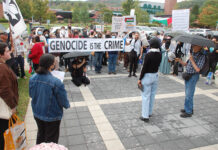
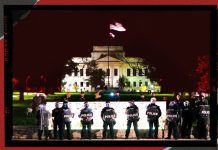
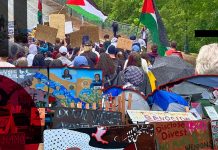
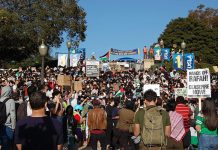
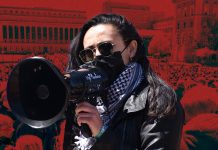

Here is a closer look at some of things that the very peaceful law abiding protesters were doing. They certainly have the right to protest peacefully.
https://www.youtube.com/watch?v=ZmBk3T935CI